University of Bolton: Part-Time Employment and Student Outcomes
VerifiedAdded on 2022/11/03
|10
|3034
|54
Report
AI Summary
This report presents a literature review investigating the impact of part-time employment on the academic performance of students. The review explores various aspects, including the motivations behind students seeking part-time jobs, the potential benefits such as financial support and practical experience, and the potential drawbacks such as reduced study time and increased stress. The research delves into the relationship between part-time work and academic outcomes, considering factors like the type of employment, the number of hours worked, and the student's field of study. The review synthesizes findings from various studies, highlighting both positive and negative impacts on students' grades, mental health, and overall well-being. The report examines the role of financial pressures, the alignment of work with academic interests, and the potential for part-time employment to enhance professional development. It concludes by discussing the implications of these findings for students, universities, and policymakers, emphasizing the need for a balanced approach that supports students' financial needs while promoting their academic success.
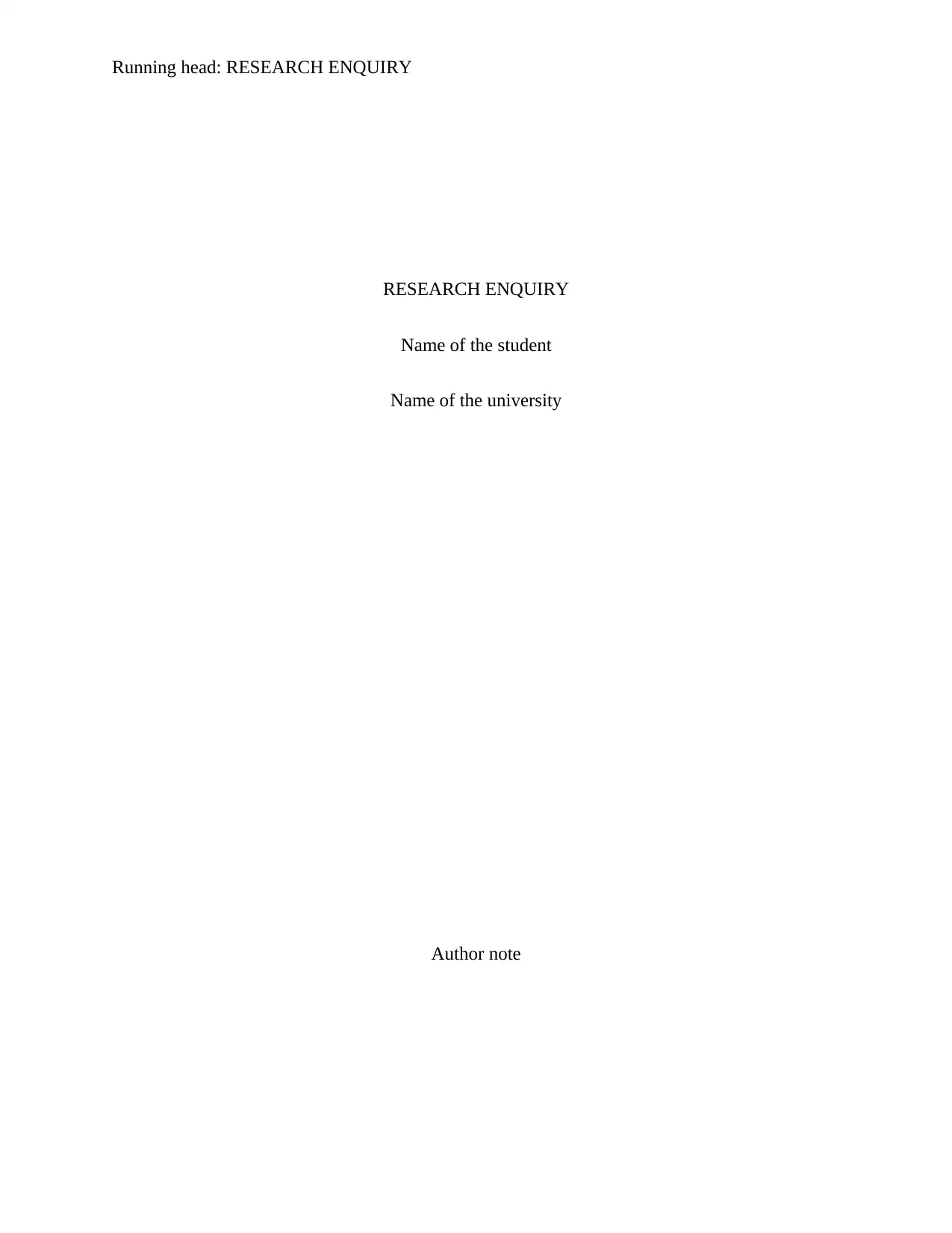
Running head: RESEARCH ENQUIRY
RESEARCH ENQUIRY
Name of the student
Name of the university
Author note
RESEARCH ENQUIRY
Name of the student
Name of the university
Author note
Paraphrase This Document
Need a fresh take? Get an instant paraphrase of this document with our AI Paraphraser
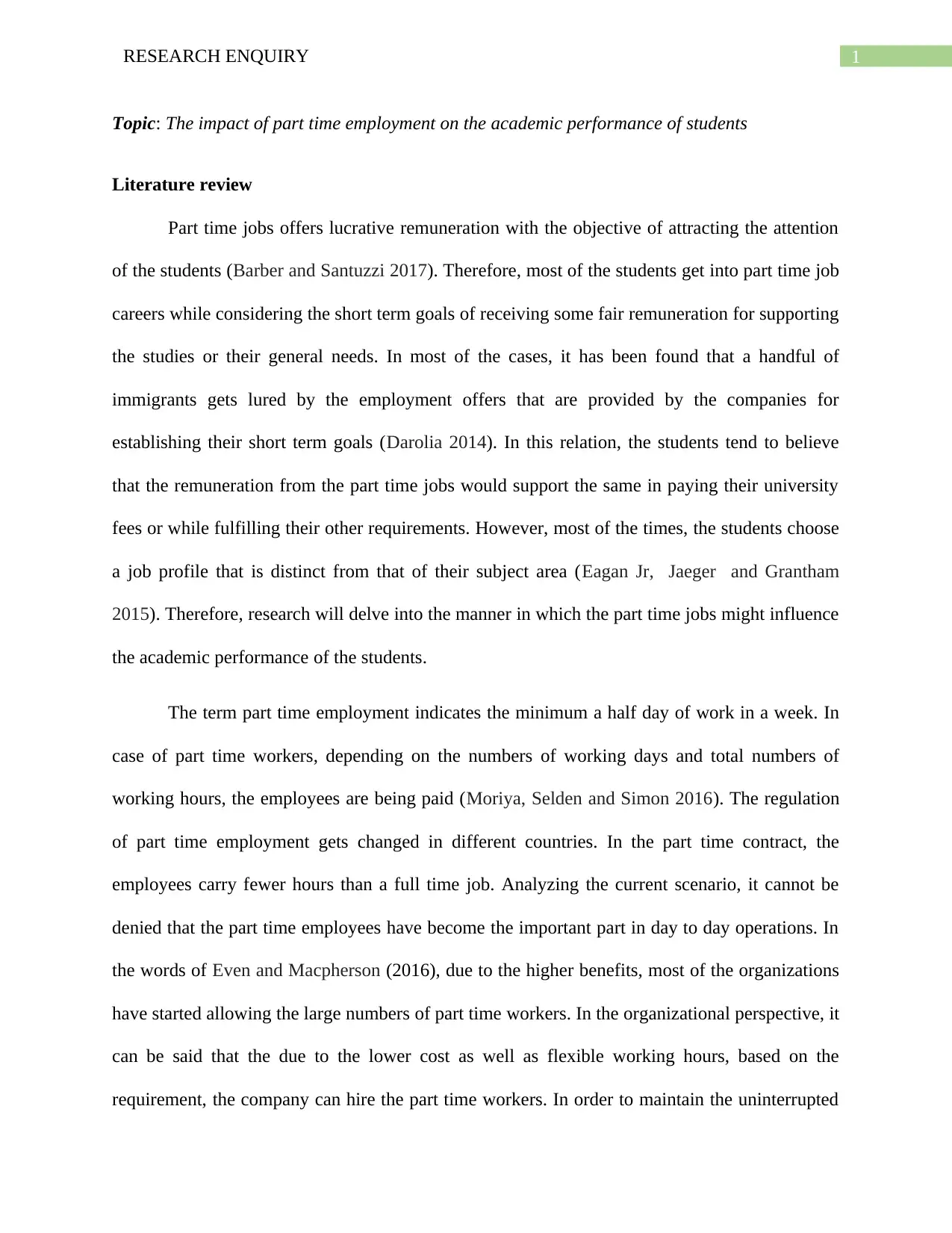
1RESEARCH ENQUIRY
Topic: The impact of part time employment on the academic performance of students
Literature review
Part time jobs offers lucrative remuneration with the objective of attracting the attention
of the students (Barber and Santuzzi 2017). Therefore, most of the students get into part time job
careers while considering the short term goals of receiving some fair remuneration for supporting
the studies or their general needs. In most of the cases, it has been found that a handful of
immigrants gets lured by the employment offers that are provided by the companies for
establishing their short term goals (Darolia 2014). In this relation, the students tend to believe
that the remuneration from the part time jobs would support the same in paying their university
fees or while fulfilling their other requirements. However, most of the times, the students choose
a job profile that is distinct from that of their subject area (Eagan Jr, Jaeger and Grantham
2015). Therefore, research will delve into the manner in which the part time jobs might influence
the academic performance of the students.
The term part time employment indicates the minimum a half day of work in a week. In
case of part time workers, depending on the numbers of working days and total numbers of
working hours, the employees are being paid (Moriya, Selden and Simon 2016). The regulation
of part time employment gets changed in different countries. In the part time contract, the
employees carry fewer hours than a full time job. Analyzing the current scenario, it cannot be
denied that the part time employees have become the important part in day to day operations. In
the words of Even and Macpherson (2016), due to the higher benefits, most of the organizations
have started allowing the large numbers of part time workers. In the organizational perspective, it
can be said that the due to the lower cost as well as flexible working hours, based on the
requirement, the company can hire the part time workers. In order to maintain the uninterrupted
Topic: The impact of part time employment on the academic performance of students
Literature review
Part time jobs offers lucrative remuneration with the objective of attracting the attention
of the students (Barber and Santuzzi 2017). Therefore, most of the students get into part time job
careers while considering the short term goals of receiving some fair remuneration for supporting
the studies or their general needs. In most of the cases, it has been found that a handful of
immigrants gets lured by the employment offers that are provided by the companies for
establishing their short term goals (Darolia 2014). In this relation, the students tend to believe
that the remuneration from the part time jobs would support the same in paying their university
fees or while fulfilling their other requirements. However, most of the times, the students choose
a job profile that is distinct from that of their subject area (Eagan Jr, Jaeger and Grantham
2015). Therefore, research will delve into the manner in which the part time jobs might influence
the academic performance of the students.
The term part time employment indicates the minimum a half day of work in a week. In
case of part time workers, depending on the numbers of working days and total numbers of
working hours, the employees are being paid (Moriya, Selden and Simon 2016). The regulation
of part time employment gets changed in different countries. In the part time contract, the
employees carry fewer hours than a full time job. Analyzing the current scenario, it cannot be
denied that the part time employees have become the important part in day to day operations. In
the words of Even and Macpherson (2016), due to the higher benefits, most of the organizations
have started allowing the large numbers of part time workers. In the organizational perspective, it
can be said that the due to the lower cost as well as flexible working hours, based on the
requirement, the company can hire the part time workers. In order to maintain the uninterrupted
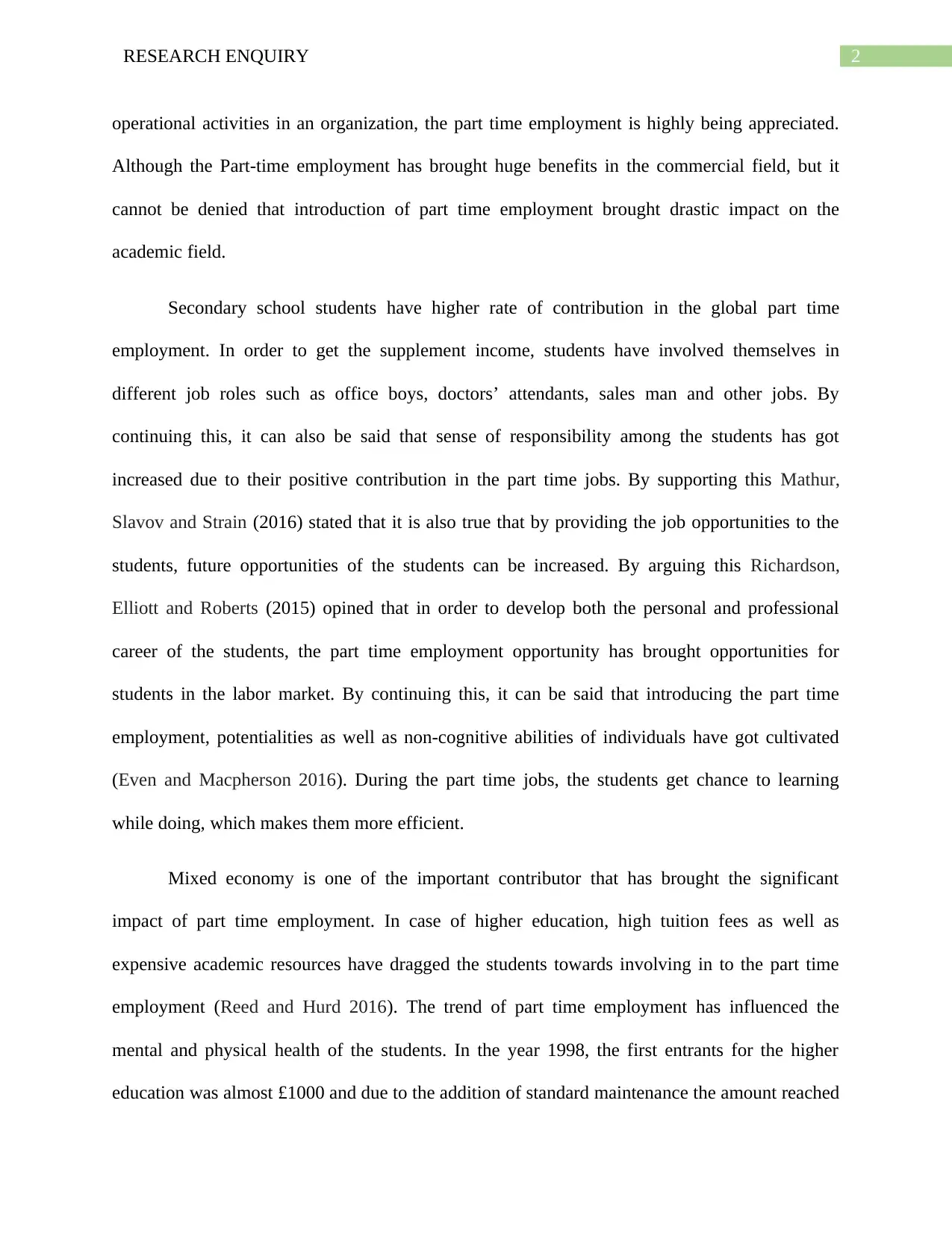
2RESEARCH ENQUIRY
operational activities in an organization, the part time employment is highly being appreciated.
Although the Part-time employment has brought huge benefits in the commercial field, but it
cannot be denied that introduction of part time employment brought drastic impact on the
academic field.
Secondary school students have higher rate of contribution in the global part time
employment. In order to get the supplement income, students have involved themselves in
different job roles such as office boys, doctors’ attendants, sales man and other jobs. By
continuing this, it can also be said that sense of responsibility among the students has got
increased due to their positive contribution in the part time jobs. By supporting this Mathur,
Slavov and Strain (2016) stated that it is also true that by providing the job opportunities to the
students, future opportunities of the students can be increased. By arguing this Richardson,
Elliott and Roberts (2015) opined that in order to develop both the personal and professional
career of the students, the part time employment opportunity has brought opportunities for
students in the labor market. By continuing this, it can be said that introducing the part time
employment, potentialities as well as non-cognitive abilities of individuals have got cultivated
(Even and Macpherson 2016). During the part time jobs, the students get chance to learning
while doing, which makes them more efficient.
Mixed economy is one of the important contributor that has brought the significant
impact of part time employment. In case of higher education, high tuition fees as well as
expensive academic resources have dragged the students towards involving in to the part time
employment (Reed and Hurd 2016). The trend of part time employment has influenced the
mental and physical health of the students. In the year 1998, the first entrants for the higher
education was almost £1000 and due to the addition of standard maintenance the amount reached
operational activities in an organization, the part time employment is highly being appreciated.
Although the Part-time employment has brought huge benefits in the commercial field, but it
cannot be denied that introduction of part time employment brought drastic impact on the
academic field.
Secondary school students have higher rate of contribution in the global part time
employment. In order to get the supplement income, students have involved themselves in
different job roles such as office boys, doctors’ attendants, sales man and other jobs. By
continuing this, it can also be said that sense of responsibility among the students has got
increased due to their positive contribution in the part time jobs. By supporting this Mathur,
Slavov and Strain (2016) stated that it is also true that by providing the job opportunities to the
students, future opportunities of the students can be increased. By arguing this Richardson,
Elliott and Roberts (2015) opined that in order to develop both the personal and professional
career of the students, the part time employment opportunity has brought opportunities for
students in the labor market. By continuing this, it can be said that introducing the part time
employment, potentialities as well as non-cognitive abilities of individuals have got cultivated
(Even and Macpherson 2016). During the part time jobs, the students get chance to learning
while doing, which makes them more efficient.
Mixed economy is one of the important contributor that has brought the significant
impact of part time employment. In case of higher education, high tuition fees as well as
expensive academic resources have dragged the students towards involving in to the part time
employment (Reed and Hurd 2016). The trend of part time employment has influenced the
mental and physical health of the students. In the year 1998, the first entrants for the higher
education was almost £1000 and due to the addition of standard maintenance the amount reached
⊘ This is a preview!⊘
Do you want full access?
Subscribe today to unlock all pages.

Trusted by 1+ million students worldwide
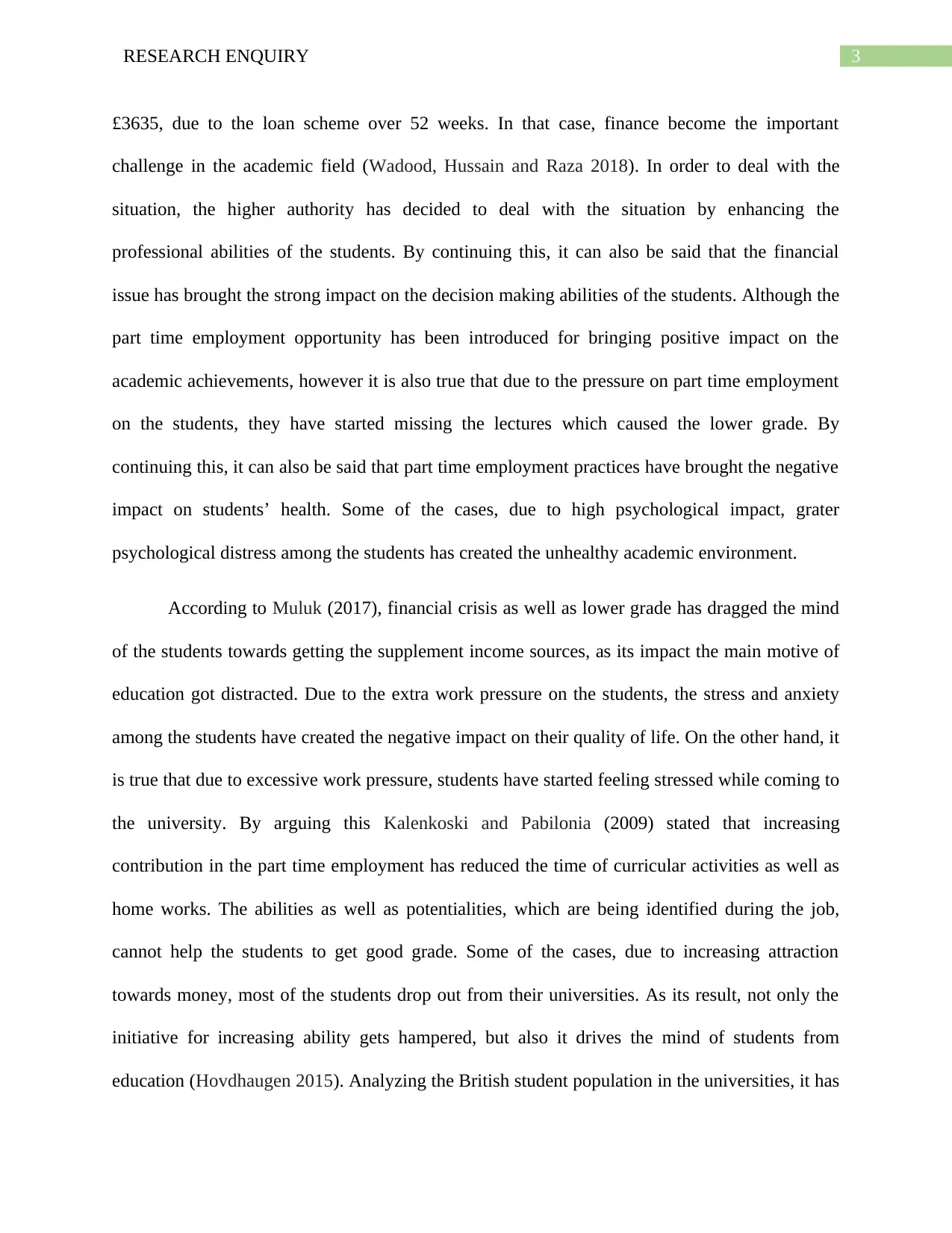
3RESEARCH ENQUIRY
£3635, due to the loan scheme over 52 weeks. In that case, finance become the important
challenge in the academic field (Wadood, Hussain and Raza 2018). In order to deal with the
situation, the higher authority has decided to deal with the situation by enhancing the
professional abilities of the students. By continuing this, it can also be said that the financial
issue has brought the strong impact on the decision making abilities of the students. Although the
part time employment opportunity has been introduced for bringing positive impact on the
academic achievements, however it is also true that due to the pressure on part time employment
on the students, they have started missing the lectures which caused the lower grade. By
continuing this, it can also be said that part time employment practices have brought the negative
impact on students’ health. Some of the cases, due to high psychological impact, grater
psychological distress among the students has created the unhealthy academic environment.
According to Muluk (2017), financial crisis as well as lower grade has dragged the mind
of the students towards getting the supplement income sources, as its impact the main motive of
education got distracted. Due to the extra work pressure on the students, the stress and anxiety
among the students have created the negative impact on their quality of life. On the other hand, it
is true that due to excessive work pressure, students have started feeling stressed while coming to
the university. By arguing this Kalenkoski and Pabilonia (2009) stated that increasing
contribution in the part time employment has reduced the time of curricular activities as well as
home works. The abilities as well as potentialities, which are being identified during the job,
cannot help the students to get good grade. Some of the cases, due to increasing attraction
towards money, most of the students drop out from their universities. As its result, not only the
initiative for increasing ability gets hampered, but also it drives the mind of students from
education (Hovdhaugen 2015). Analyzing the British student population in the universities, it has
£3635, due to the loan scheme over 52 weeks. In that case, finance become the important
challenge in the academic field (Wadood, Hussain and Raza 2018). In order to deal with the
situation, the higher authority has decided to deal with the situation by enhancing the
professional abilities of the students. By continuing this, it can also be said that the financial
issue has brought the strong impact on the decision making abilities of the students. Although the
part time employment opportunity has been introduced for bringing positive impact on the
academic achievements, however it is also true that due to the pressure on part time employment
on the students, they have started missing the lectures which caused the lower grade. By
continuing this, it can also be said that part time employment practices have brought the negative
impact on students’ health. Some of the cases, due to high psychological impact, grater
psychological distress among the students has created the unhealthy academic environment.
According to Muluk (2017), financial crisis as well as lower grade has dragged the mind
of the students towards getting the supplement income sources, as its impact the main motive of
education got distracted. Due to the extra work pressure on the students, the stress and anxiety
among the students have created the negative impact on their quality of life. On the other hand, it
is true that due to excessive work pressure, students have started feeling stressed while coming to
the university. By arguing this Kalenkoski and Pabilonia (2009) stated that increasing
contribution in the part time employment has reduced the time of curricular activities as well as
home works. The abilities as well as potentialities, which are being identified during the job,
cannot help the students to get good grade. Some of the cases, due to increasing attraction
towards money, most of the students drop out from their universities. As its result, not only the
initiative for increasing ability gets hampered, but also it drives the mind of students from
education (Hovdhaugen 2015). Analyzing the British student population in the universities, it has
Paraphrase This Document
Need a fresh take? Get an instant paraphrase of this document with our AI Paraphraser
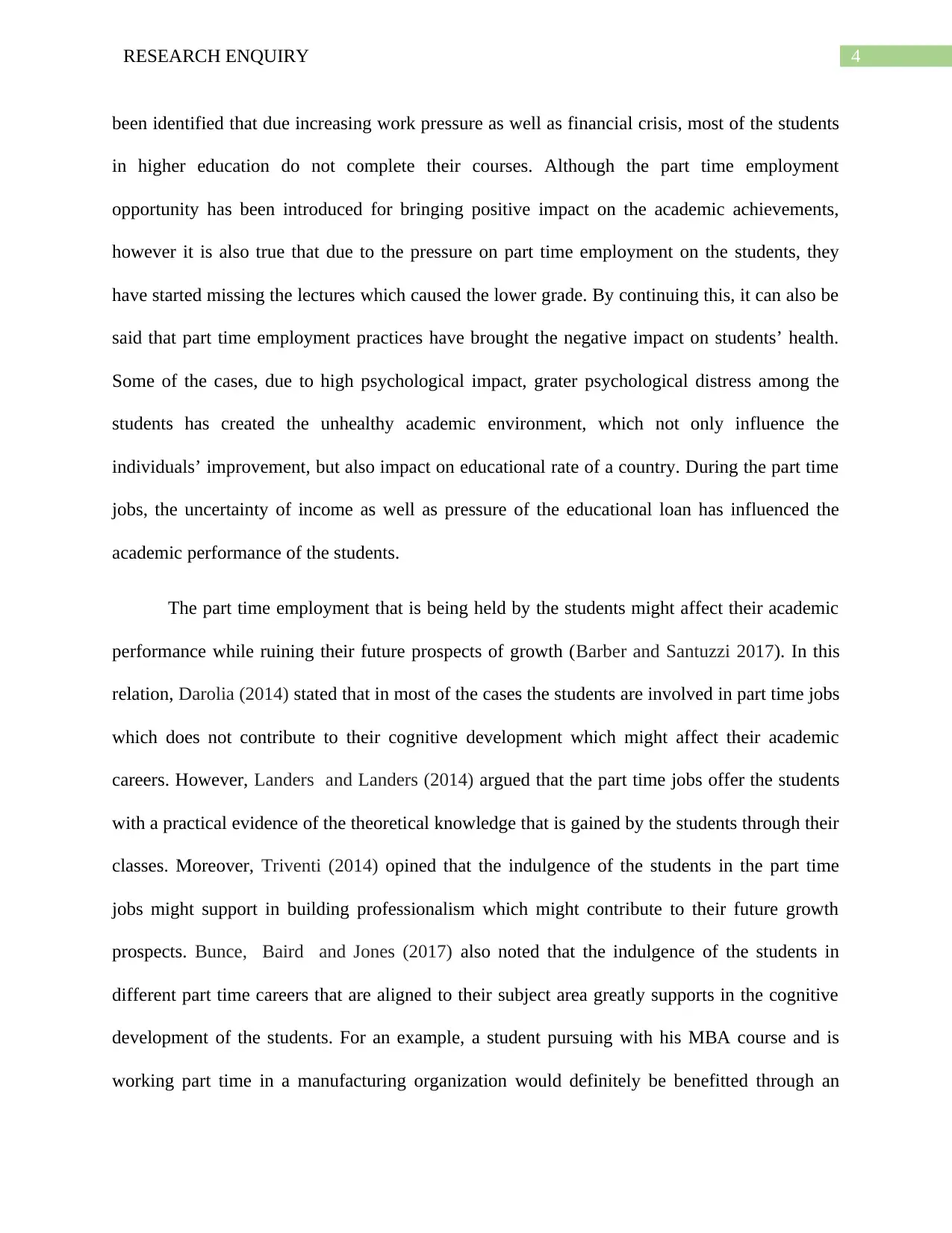
4RESEARCH ENQUIRY
been identified that due increasing work pressure as well as financial crisis, most of the students
in higher education do not complete their courses. Although the part time employment
opportunity has been introduced for bringing positive impact on the academic achievements,
however it is also true that due to the pressure on part time employment on the students, they
have started missing the lectures which caused the lower grade. By continuing this, it can also be
said that part time employment practices have brought the negative impact on students’ health.
Some of the cases, due to high psychological impact, grater psychological distress among the
students has created the unhealthy academic environment, which not only influence the
individuals’ improvement, but also impact on educational rate of a country. During the part time
jobs, the uncertainty of income as well as pressure of the educational loan has influenced the
academic performance of the students.
The part time employment that is being held by the students might affect their academic
performance while ruining their future prospects of growth (Barber and Santuzzi 2017). In this
relation, Darolia (2014) stated that in most of the cases the students are involved in part time jobs
which does not contribute to their cognitive development which might affect their academic
careers. However, Landers and Landers (2014) argued that the part time jobs offer the students
with a practical evidence of the theoretical knowledge that is gained by the students through their
classes. Moreover, Triventi (2014) opined that the indulgence of the students in the part time
jobs might support in building professionalism which might contribute to their future growth
prospects. Bunce, Baird and Jones (2017) also noted that the indulgence of the students in
different part time careers that are aligned to their subject area greatly supports in the cognitive
development of the students. For an example, a student pursuing with his MBA course and is
working part time in a manufacturing organization would definitely be benefitted through an
been identified that due increasing work pressure as well as financial crisis, most of the students
in higher education do not complete their courses. Although the part time employment
opportunity has been introduced for bringing positive impact on the academic achievements,
however it is also true that due to the pressure on part time employment on the students, they
have started missing the lectures which caused the lower grade. By continuing this, it can also be
said that part time employment practices have brought the negative impact on students’ health.
Some of the cases, due to high psychological impact, grater psychological distress among the
students has created the unhealthy academic environment, which not only influence the
individuals’ improvement, but also impact on educational rate of a country. During the part time
jobs, the uncertainty of income as well as pressure of the educational loan has influenced the
academic performance of the students.
The part time employment that is being held by the students might affect their academic
performance while ruining their future prospects of growth (Barber and Santuzzi 2017). In this
relation, Darolia (2014) stated that in most of the cases the students are involved in part time jobs
which does not contribute to their cognitive development which might affect their academic
careers. However, Landers and Landers (2014) argued that the part time jobs offer the students
with a practical evidence of the theoretical knowledge that is gained by the students through their
classes. Moreover, Triventi (2014) opined that the indulgence of the students in the part time
jobs might support in building professionalism which might contribute to their future growth
prospects. Bunce, Baird and Jones (2017) also noted that the indulgence of the students in
different part time careers that are aligned to their subject area greatly supports in the cognitive
development of the students. For an example, a student pursuing with his MBA course and is
working part time in a manufacturing organization would definitely be benefitted through an
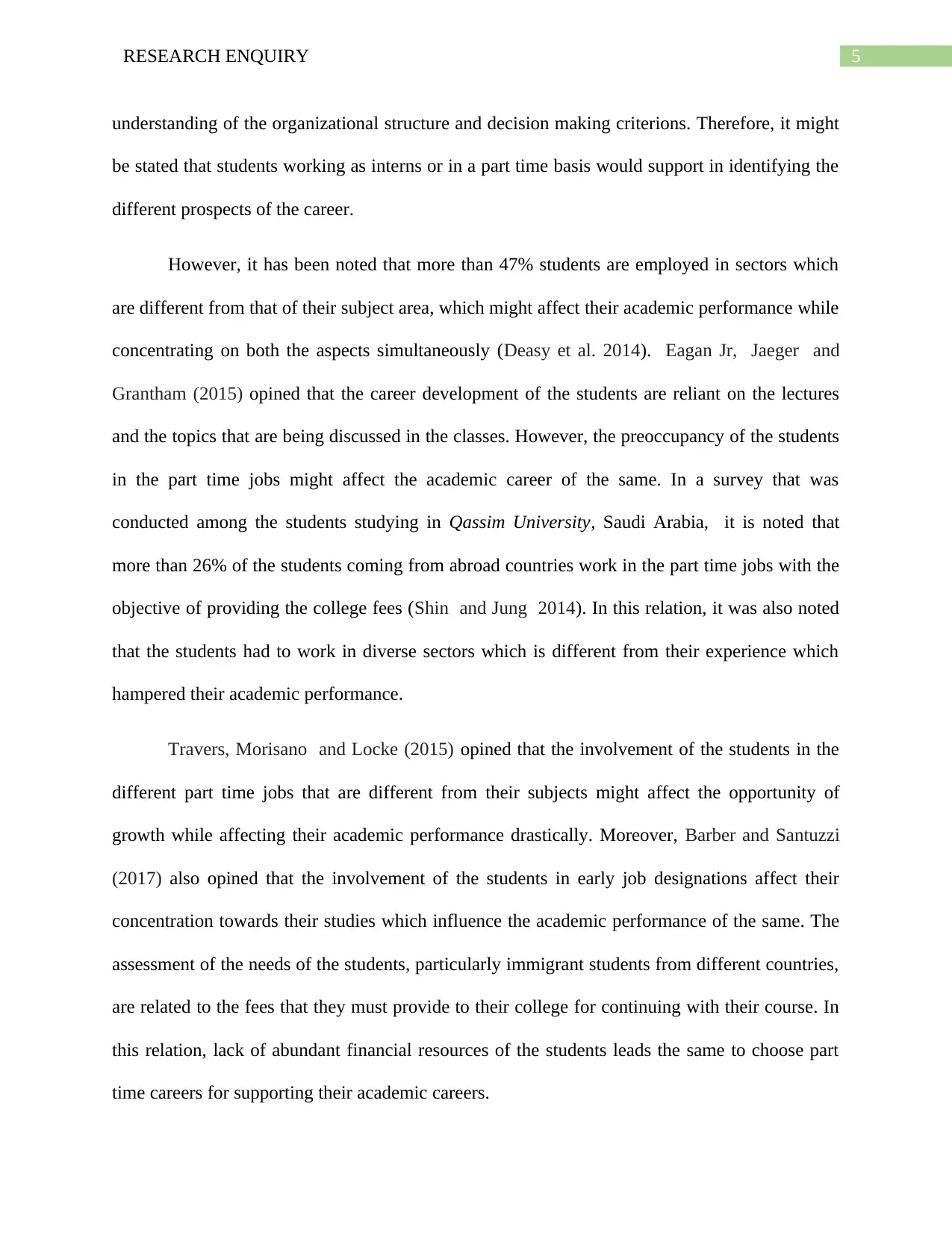
5RESEARCH ENQUIRY
understanding of the organizational structure and decision making criterions. Therefore, it might
be stated that students working as interns or in a part time basis would support in identifying the
different prospects of the career.
However, it has been noted that more than 47% students are employed in sectors which
are different from that of their subject area, which might affect their academic performance while
concentrating on both the aspects simultaneously (Deasy et al. 2014). Eagan Jr, Jaeger and
Grantham (2015) opined that the career development of the students are reliant on the lectures
and the topics that are being discussed in the classes. However, the preoccupancy of the students
in the part time jobs might affect the academic career of the same. In a survey that was
conducted among the students studying in Qassim University, Saudi Arabia, it is noted that
more than 26% of the students coming from abroad countries work in the part time jobs with the
objective of providing the college fees (Shin and Jung 2014). In this relation, it was also noted
that the students had to work in diverse sectors which is different from their experience which
hampered their academic performance.
Travers, Morisano and Locke (2015) opined that the involvement of the students in the
different part time jobs that are different from their subjects might affect the opportunity of
growth while affecting their academic performance drastically. Moreover, Barber and Santuzzi
(2017) also opined that the involvement of the students in early job designations affect their
concentration towards their studies which influence the academic performance of the same. The
assessment of the needs of the students, particularly immigrant students from different countries,
are related to the fees that they must provide to their college for continuing with their course. In
this relation, lack of abundant financial resources of the students leads the same to choose part
time careers for supporting their academic careers.
understanding of the organizational structure and decision making criterions. Therefore, it might
be stated that students working as interns or in a part time basis would support in identifying the
different prospects of the career.
However, it has been noted that more than 47% students are employed in sectors which
are different from that of their subject area, which might affect their academic performance while
concentrating on both the aspects simultaneously (Deasy et al. 2014). Eagan Jr, Jaeger and
Grantham (2015) opined that the career development of the students are reliant on the lectures
and the topics that are being discussed in the classes. However, the preoccupancy of the students
in the part time jobs might affect the academic career of the same. In a survey that was
conducted among the students studying in Qassim University, Saudi Arabia, it is noted that
more than 26% of the students coming from abroad countries work in the part time jobs with the
objective of providing the college fees (Shin and Jung 2014). In this relation, it was also noted
that the students had to work in diverse sectors which is different from their experience which
hampered their academic performance.
Travers, Morisano and Locke (2015) opined that the involvement of the students in the
different part time jobs that are different from their subjects might affect the opportunity of
growth while affecting their academic performance drastically. Moreover, Barber and Santuzzi
(2017) also opined that the involvement of the students in early job designations affect their
concentration towards their studies which influence the academic performance of the same. The
assessment of the needs of the students, particularly immigrant students from different countries,
are related to the fees that they must provide to their college for continuing with their course. In
this relation, lack of abundant financial resources of the students leads the same to choose part
time careers for supporting their academic careers.
⊘ This is a preview!⊘
Do you want full access?
Subscribe today to unlock all pages.

Trusted by 1+ million students worldwide
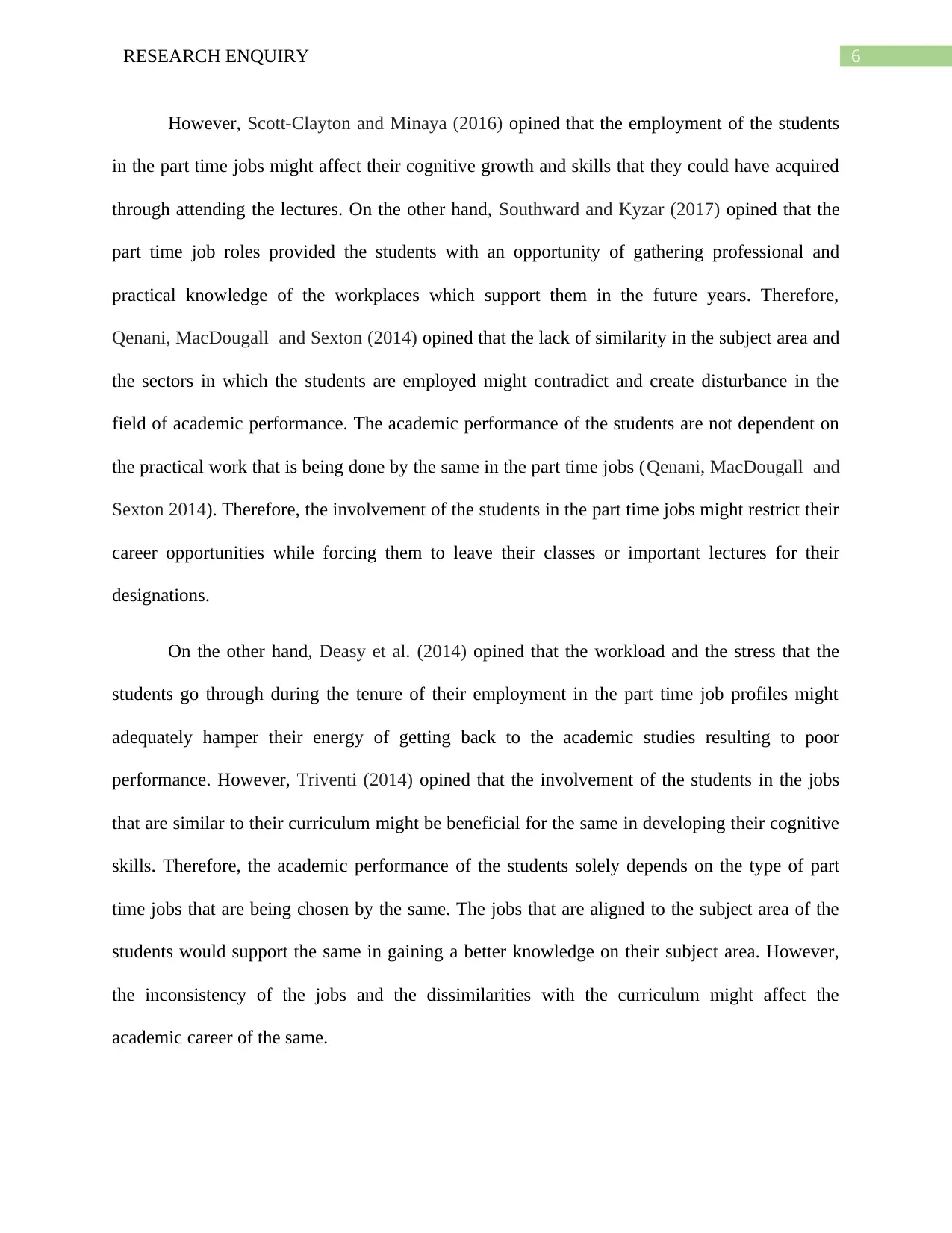
6RESEARCH ENQUIRY
However, Scott-Clayton and Minaya (2016) opined that the employment of the students
in the part time jobs might affect their cognitive growth and skills that they could have acquired
through attending the lectures. On the other hand, Southward and Kyzar (2017) opined that the
part time job roles provided the students with an opportunity of gathering professional and
practical knowledge of the workplaces which support them in the future years. Therefore,
Qenani, MacDougall and Sexton (2014) opined that the lack of similarity in the subject area and
the sectors in which the students are employed might contradict and create disturbance in the
field of academic performance. The academic performance of the students are not dependent on
the practical work that is being done by the same in the part time jobs (Qenani, MacDougall and
Sexton 2014). Therefore, the involvement of the students in the part time jobs might restrict their
career opportunities while forcing them to leave their classes or important lectures for their
designations.
On the other hand, Deasy et al. (2014) opined that the workload and the stress that the
students go through during the tenure of their employment in the part time job profiles might
adequately hamper their energy of getting back to the academic studies resulting to poor
performance. However, Triventi (2014) opined that the involvement of the students in the jobs
that are similar to their curriculum might be beneficial for the same in developing their cognitive
skills. Therefore, the academic performance of the students solely depends on the type of part
time jobs that are being chosen by the same. The jobs that are aligned to the subject area of the
students would support the same in gaining a better knowledge on their subject area. However,
the inconsistency of the jobs and the dissimilarities with the curriculum might affect the
academic career of the same.
However, Scott-Clayton and Minaya (2016) opined that the employment of the students
in the part time jobs might affect their cognitive growth and skills that they could have acquired
through attending the lectures. On the other hand, Southward and Kyzar (2017) opined that the
part time job roles provided the students with an opportunity of gathering professional and
practical knowledge of the workplaces which support them in the future years. Therefore,
Qenani, MacDougall and Sexton (2014) opined that the lack of similarity in the subject area and
the sectors in which the students are employed might contradict and create disturbance in the
field of academic performance. The academic performance of the students are not dependent on
the practical work that is being done by the same in the part time jobs (Qenani, MacDougall and
Sexton 2014). Therefore, the involvement of the students in the part time jobs might restrict their
career opportunities while forcing them to leave their classes or important lectures for their
designations.
On the other hand, Deasy et al. (2014) opined that the workload and the stress that the
students go through during the tenure of their employment in the part time job profiles might
adequately hamper their energy of getting back to the academic studies resulting to poor
performance. However, Triventi (2014) opined that the involvement of the students in the jobs
that are similar to their curriculum might be beneficial for the same in developing their cognitive
skills. Therefore, the academic performance of the students solely depends on the type of part
time jobs that are being chosen by the same. The jobs that are aligned to the subject area of the
students would support the same in gaining a better knowledge on their subject area. However,
the inconsistency of the jobs and the dissimilarities with the curriculum might affect the
academic career of the same.
Paraphrase This Document
Need a fresh take? Get an instant paraphrase of this document with our AI Paraphraser
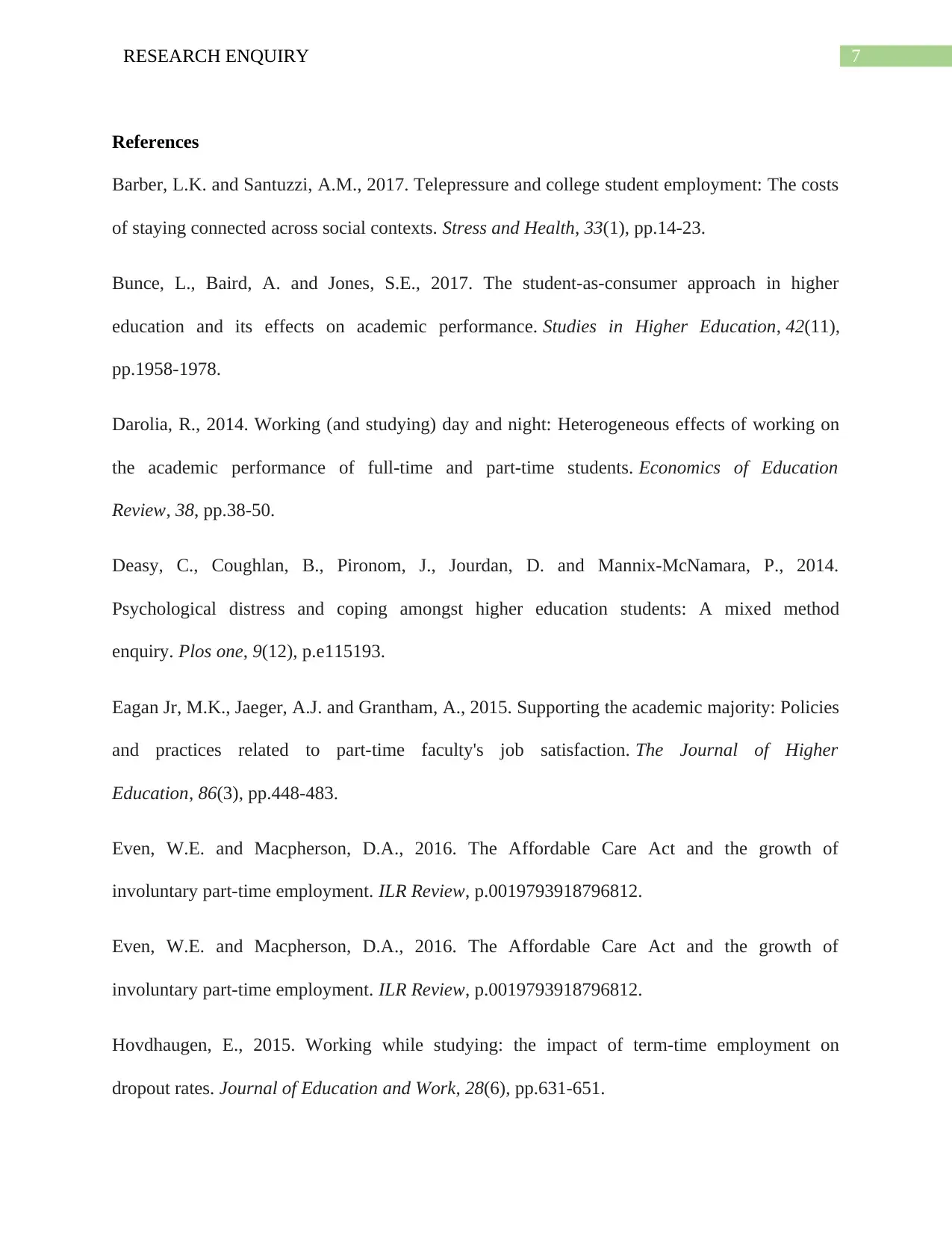
7RESEARCH ENQUIRY
References
Barber, L.K. and Santuzzi, A.M., 2017. Telepressure and college student employment: The costs
of staying connected across social contexts. Stress and Health, 33(1), pp.14-23.
Bunce, L., Baird, A. and Jones, S.E., 2017. The student-as-consumer approach in higher
education and its effects on academic performance. Studies in Higher Education, 42(11),
pp.1958-1978.
Darolia, R., 2014. Working (and studying) day and night: Heterogeneous effects of working on
the academic performance of full-time and part-time students. Economics of Education
Review, 38, pp.38-50.
Deasy, C., Coughlan, B., Pironom, J., Jourdan, D. and Mannix-McNamara, P., 2014.
Psychological distress and coping amongst higher education students: A mixed method
enquiry. Plos one, 9(12), p.e115193.
Eagan Jr, M.K., Jaeger, A.J. and Grantham, A., 2015. Supporting the academic majority: Policies
and practices related to part-time faculty's job satisfaction. The Journal of Higher
Education, 86(3), pp.448-483.
Even, W.E. and Macpherson, D.A., 2016. The Affordable Care Act and the growth of
involuntary part-time employment. ILR Review, p.0019793918796812.
Even, W.E. and Macpherson, D.A., 2016. The Affordable Care Act and the growth of
involuntary part-time employment. ILR Review, p.0019793918796812.
Hovdhaugen, E., 2015. Working while studying: the impact of term-time employment on
dropout rates. Journal of Education and Work, 28(6), pp.631-651.
References
Barber, L.K. and Santuzzi, A.M., 2017. Telepressure and college student employment: The costs
of staying connected across social contexts. Stress and Health, 33(1), pp.14-23.
Bunce, L., Baird, A. and Jones, S.E., 2017. The student-as-consumer approach in higher
education and its effects on academic performance. Studies in Higher Education, 42(11),
pp.1958-1978.
Darolia, R., 2014. Working (and studying) day and night: Heterogeneous effects of working on
the academic performance of full-time and part-time students. Economics of Education
Review, 38, pp.38-50.
Deasy, C., Coughlan, B., Pironom, J., Jourdan, D. and Mannix-McNamara, P., 2014.
Psychological distress and coping amongst higher education students: A mixed method
enquiry. Plos one, 9(12), p.e115193.
Eagan Jr, M.K., Jaeger, A.J. and Grantham, A., 2015. Supporting the academic majority: Policies
and practices related to part-time faculty's job satisfaction. The Journal of Higher
Education, 86(3), pp.448-483.
Even, W.E. and Macpherson, D.A., 2016. The Affordable Care Act and the growth of
involuntary part-time employment. ILR Review, p.0019793918796812.
Even, W.E. and Macpherson, D.A., 2016. The Affordable Care Act and the growth of
involuntary part-time employment. ILR Review, p.0019793918796812.
Hovdhaugen, E., 2015. Working while studying: the impact of term-time employment on
dropout rates. Journal of Education and Work, 28(6), pp.631-651.
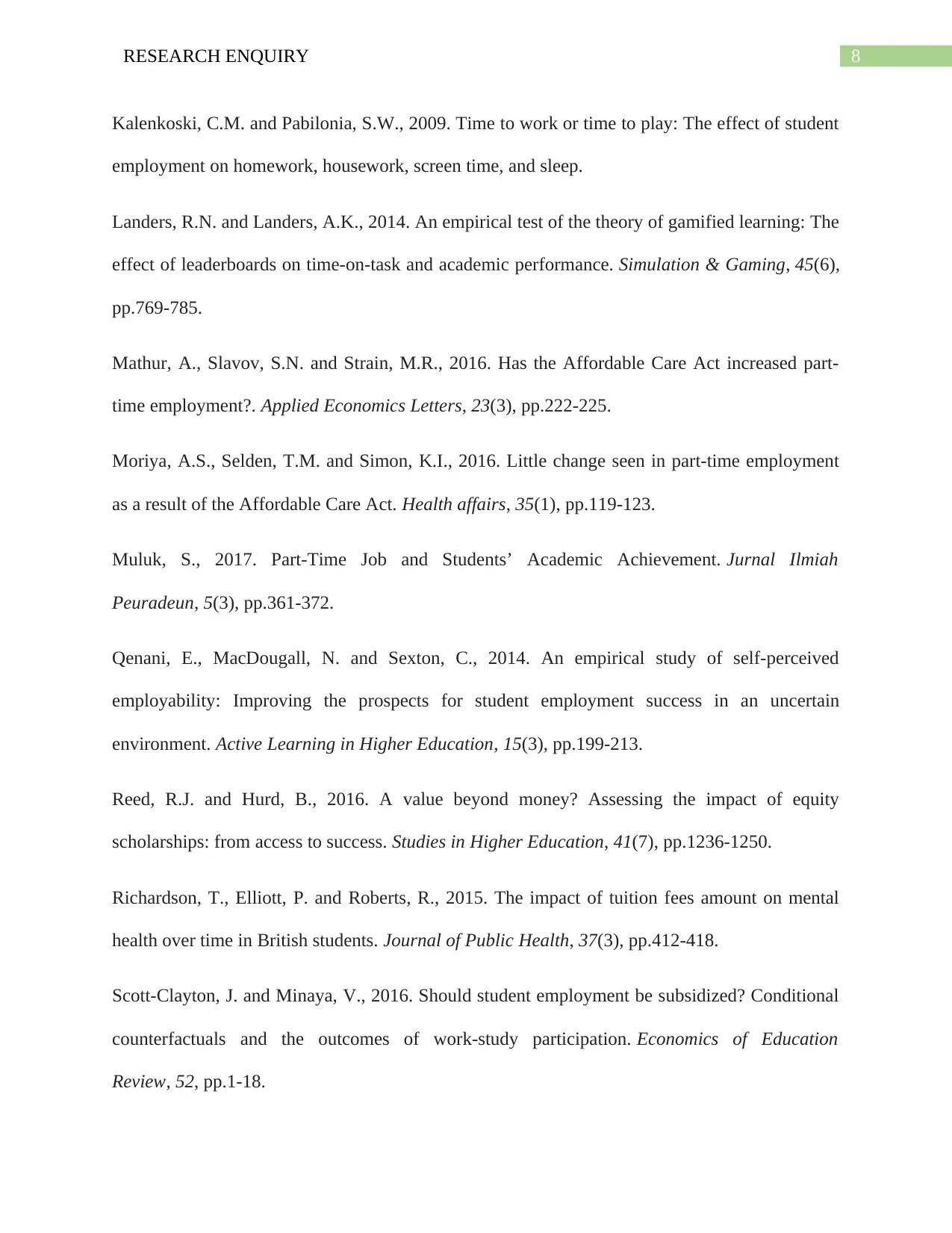
8RESEARCH ENQUIRY
Kalenkoski, C.M. and Pabilonia, S.W., 2009. Time to work or time to play: The effect of student
employment on homework, housework, screen time, and sleep.
Landers, R.N. and Landers, A.K., 2014. An empirical test of the theory of gamified learning: The
effect of leaderboards on time-on-task and academic performance. Simulation & Gaming, 45(6),
pp.769-785.
Mathur, A., Slavov, S.N. and Strain, M.R., 2016. Has the Affordable Care Act increased part-
time employment?. Applied Economics Letters, 23(3), pp.222-225.
Moriya, A.S., Selden, T.M. and Simon, K.I., 2016. Little change seen in part-time employment
as a result of the Affordable Care Act. Health affairs, 35(1), pp.119-123.
Muluk, S., 2017. Part-Time Job and Students’ Academic Achievement. Jurnal Ilmiah
Peuradeun, 5(3), pp.361-372.
Qenani, E., MacDougall, N. and Sexton, C., 2014. An empirical study of self-perceived
employability: Improving the prospects for student employment success in an uncertain
environment. Active Learning in Higher Education, 15(3), pp.199-213.
Reed, R.J. and Hurd, B., 2016. A value beyond money? Assessing the impact of equity
scholarships: from access to success. Studies in Higher Education, 41(7), pp.1236-1250.
Richardson, T., Elliott, P. and Roberts, R., 2015. The impact of tuition fees amount on mental
health over time in British students. Journal of Public Health, 37(3), pp.412-418.
Scott-Clayton, J. and Minaya, V., 2016. Should student employment be subsidized? Conditional
counterfactuals and the outcomes of work-study participation. Economics of Education
Review, 52, pp.1-18.
Kalenkoski, C.M. and Pabilonia, S.W., 2009. Time to work or time to play: The effect of student
employment on homework, housework, screen time, and sleep.
Landers, R.N. and Landers, A.K., 2014. An empirical test of the theory of gamified learning: The
effect of leaderboards on time-on-task and academic performance. Simulation & Gaming, 45(6),
pp.769-785.
Mathur, A., Slavov, S.N. and Strain, M.R., 2016. Has the Affordable Care Act increased part-
time employment?. Applied Economics Letters, 23(3), pp.222-225.
Moriya, A.S., Selden, T.M. and Simon, K.I., 2016. Little change seen in part-time employment
as a result of the Affordable Care Act. Health affairs, 35(1), pp.119-123.
Muluk, S., 2017. Part-Time Job and Students’ Academic Achievement. Jurnal Ilmiah
Peuradeun, 5(3), pp.361-372.
Qenani, E., MacDougall, N. and Sexton, C., 2014. An empirical study of self-perceived
employability: Improving the prospects for student employment success in an uncertain
environment. Active Learning in Higher Education, 15(3), pp.199-213.
Reed, R.J. and Hurd, B., 2016. A value beyond money? Assessing the impact of equity
scholarships: from access to success. Studies in Higher Education, 41(7), pp.1236-1250.
Richardson, T., Elliott, P. and Roberts, R., 2015. The impact of tuition fees amount on mental
health over time in British students. Journal of Public Health, 37(3), pp.412-418.
Scott-Clayton, J. and Minaya, V., 2016. Should student employment be subsidized? Conditional
counterfactuals and the outcomes of work-study participation. Economics of Education
Review, 52, pp.1-18.
⊘ This is a preview!⊘
Do you want full access?
Subscribe today to unlock all pages.

Trusted by 1+ million students worldwide
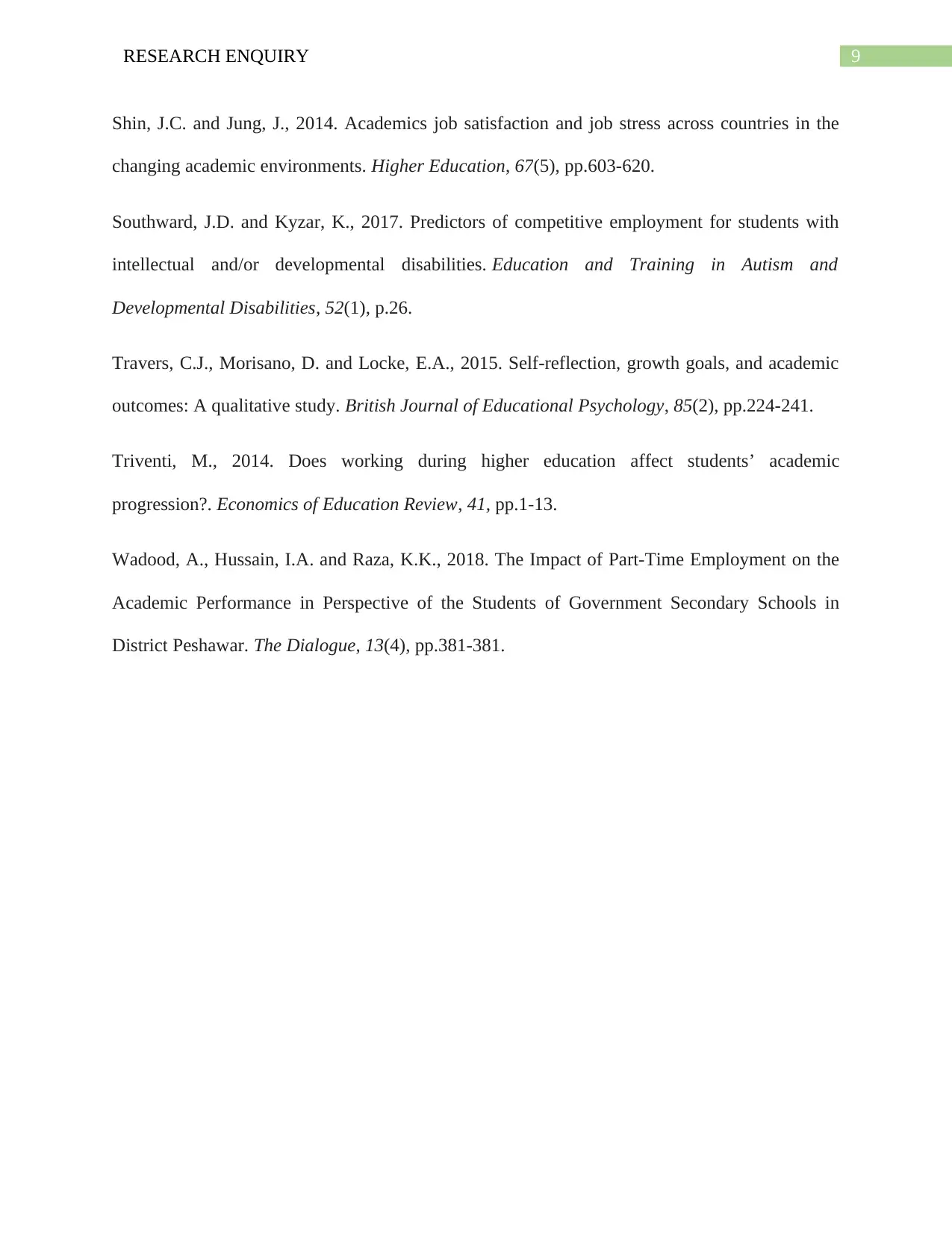
9RESEARCH ENQUIRY
Shin, J.C. and Jung, J., 2014. Academics job satisfaction and job stress across countries in the
changing academic environments. Higher Education, 67(5), pp.603-620.
Southward, J.D. and Kyzar, K., 2017. Predictors of competitive employment for students with
intellectual and/or developmental disabilities. Education and Training in Autism and
Developmental Disabilities, 52(1), p.26.
Travers, C.J., Morisano, D. and Locke, E.A., 2015. Self‐reflection, growth goals, and academic
outcomes: A qualitative study. British Journal of Educational Psychology, 85(2), pp.224-241.
Triventi, M., 2014. Does working during higher education affect students’ academic
progression?. Economics of Education Review, 41, pp.1-13.
Wadood, A., Hussain, I.A. and Raza, K.K., 2018. The Impact of Part-Time Employment on the
Academic Performance in Perspective of the Students of Government Secondary Schools in
District Peshawar. The Dialogue, 13(4), pp.381-381.
Shin, J.C. and Jung, J., 2014. Academics job satisfaction and job stress across countries in the
changing academic environments. Higher Education, 67(5), pp.603-620.
Southward, J.D. and Kyzar, K., 2017. Predictors of competitive employment for students with
intellectual and/or developmental disabilities. Education and Training in Autism and
Developmental Disabilities, 52(1), p.26.
Travers, C.J., Morisano, D. and Locke, E.A., 2015. Self‐reflection, growth goals, and academic
outcomes: A qualitative study. British Journal of Educational Psychology, 85(2), pp.224-241.
Triventi, M., 2014. Does working during higher education affect students’ academic
progression?. Economics of Education Review, 41, pp.1-13.
Wadood, A., Hussain, I.A. and Raza, K.K., 2018. The Impact of Part-Time Employment on the
Academic Performance in Perspective of the Students of Government Secondary Schools in
District Peshawar. The Dialogue, 13(4), pp.381-381.
1 out of 10
Related Documents
Your All-in-One AI-Powered Toolkit for Academic Success.
+13062052269
info@desklib.com
Available 24*7 on WhatsApp / Email
![[object Object]](/_next/static/media/star-bottom.7253800d.svg)
Unlock your academic potential
Copyright © 2020–2025 A2Z Services. All Rights Reserved. Developed and managed by ZUCOL.





